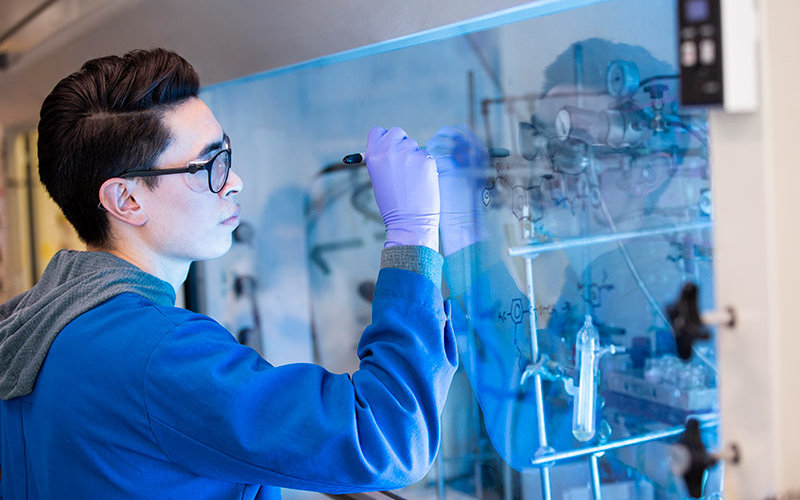
Chemistry graduate student Alex Ku’s faculty mentors call him a caring and devoted student teacher who has a passion for science. His students view him as “a natural teacher, someone who has an excellent grasp of the subject matter and shows a clear interest in chemistry.”
For his outstanding work in the classroom as a teaching associate in the Department of Chemistry and Biochemistry, Ku is a recipient of the Crellin Pauling Student Teaching Award from the California State University Program for Education and Research in Biotechnology (CSUPERB).
Ku earned a bachelor’s degree in biochemistry from Cal State Fullerton in 2016 and is on track to earn a master’s degree in chemistry in May. He started teaching the “Survey of Chemistry Laboratory” and progressed to teaching the second semester of the general chemistry laboratory course.
“It takes great effort and dedication behind the scenes to be such a well-rounded teaching assistant. Whether Alex is teaching or in the research laboratory, he is always discovering ways to teach people. He truly cares about supporting our students and improving their education,” shared Nicholas T. Salzameda, associate professor of chemistry and biochemistry, and Ku’s research adviser, and Beena Matthew, lecturer in chemistry and biochemistry, in their nomination letter.
What do you enjoy most about teaching?
The most rewarding part about teaching is guiding students in finding the correct answer on their own and seeing their faces light up when the concept finally clicks. Through teaching, I have learned the value of being a supportive role model to build up the people around me.
How do you hope you are inspiring students?
I try to convey my passion for science to my students in hopes that it is contagious, so they develop a curiosity for science not only in the lab, but in their everyday life.
How will your graduate work help you in your future career?
My career goal is to work in an organic synthesis lab doing research and development. Part of working in a lab is being able to problem-solve and help people learn and understand chemistry. I hope to find a position that will be interesting, challenging and meaningful. I also have grown to love teaching and will always consider it as a possible path.
What is the focus of your thesis research?
I am working on developing new compounds to counteract the deadly effects of botulinum neurotoxin, which is the cause of botulism, a potentially lethal disease. Botulinum neurotoxin is the most potent neurotoxin known to man and has the potential to be used as a chemical weapon, so developing countermeasures are a priority.
What have you learned from your research experience?
I’ve learned the methodical process of synthesizing these compounds step-by- step, testing their effectiveness and making rational modifications to improve their effectiveness. It’s what keeps me interested and motivated to come into the lab daily. I also hope to develop my skills and confidence as a synthetic chemist. Additionally, Dr. Salzameda has been pivotal in my academic and personal development. He is a constant source of support, and motivates and challenges me to go outside of my comfort zone to not only grow as a scientist, but as a person.